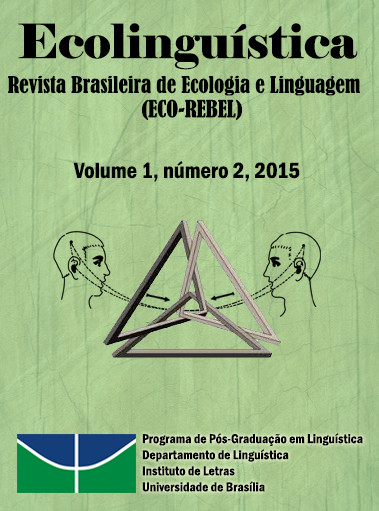O tao da linguagem: semelhanças entre linguística, construtivismo social e misticismo
Keywords:
Language; Semantics; Social constructivism; Taoism; Zen-Buddhism.Abstract
The main purpose of this article is to show that sociology and linguistics contain ideas that are similar do oriental philosophy ”“ these will be discussed here too ”“. Further, I intend to show that these similarities are also present in other disciplines, especially modern physics as demonstrated in Capra (1999, 1982). An emphasis in these similarities combined with a synthesis of those traditions and other sciences are more useful than looking for dissimilarities among them. Key-words: Language; Semantics; Social constructivism; Taoism; Zen-Buddhism.References
BARTHES, R. (1972) Mythologies (translated, original 1957). London: Vintage Berlin, Brent and D Breedlove and P Raven (1974) Principles of Tzeltal Plant Classification. New York: Academic Press
BOURDIEU, P. (1991) Language and Symbolic Power (translated, original 1982). Mass.: Harvard University Press
BURR, V. (1995) An Introduction to Social Constructionism. London: Routledge
CANN, R. (1993) Formal Semantics: An introduction. Cambridge University Press
CAPRA, F. (1982) The Turning Point: Science, society and the rising culture. London: Harper Collins
CAPRA, F. (1999) The Tao of Physics: An exploration of the parallels between modern physics and Eastern mysticism (4th edition, 1st edition published 1975). Boston: Shambala
CHUANG, T. (2001) Teachings and sayings of Chuang Tzu (translation, original around 300BCE) New York: Dover
FAIRCLOUGH, N. (1989) Language and Power. London: Longman
FAIRCLOUGH, N. (1992) Discourse and Social Change. Cambridge: Polity Press
FOWLER, R. (1991) Language in the News: Discourse and Ideology in the Press. London: Routledge
GERGEN, K. (1999) An Invitation to Social Construction. London: Sage
GRIGG, R. (1994) The Tao of Zen. Boston: Alva Press
HACKING, I. (1999) The Social Construction of What? Mass.: Harvard University Press
HAGEN, S. (1997) Buddhism Plain and Simple. New York: Broadway Books
HAKUIN, Z. (1996) Zen Words for the Heart: Hakuin's commentary on the Heart Sutra (translated by Norman Waddell, original 1744). London: Shambala
HANH, T. N. (1988) The Heart of Understanding: commentaries on the Prajñaparamita Heart Sutra. Berkeley: Parallax
HARADA, S. (1993) The essence of Zen: Dharma talks given in Europe and America. Tokyo: Kodansha
HUANG, A. (1998) The complete I Ching. Rochester: Inner Traditions
LAKOFF, G. ; JOHNSON, M. (1999) Philosophy in the Flesh: The Embodied Mind and its Challenge to Western Thought. New York: Basic Books
LAO, T. (1997) Tao Te Ching (translated, original around 400 BCE). Herts: Wordsworth
MCPHAIL, M. (1996) Zen in the art of Rhetoric: an inquiry into coherence. New York: State University of New York Press
OLSON, C. (2000) Zen and the Art of Postmodern Philosophy. New York: State University of New York Press
POTTER, J. (1996) Representing Reality: Discourse, Rhetoric and Social Construction. London: Sage.
ROSCH, E. (1973), 'On the internal structure of perceptual and semantic categories' In: MOORE, T. ed., Cognitive development and the acquisition of language. London: Academic Press, 111-144
ROSCH, E. (1975) 'Cognitive representations of semantic categories'. Journal of experimental psychology, general 104, 193-233
STIBBE (2001) 'Semantic classification and ideology' Journal of Chikushi Jogakuen University. 13:125-146
SUZUKI, D. T. (1964) An Introduction to Zen Buddhism. New York: Grove Press
SUZUKI, D. T. (1970) Zen and Japanese Culture. NJ: Princeton University Press
VAN DIJK, T. (1993) ‘Principles of Critical Discourse Analysis’ Discourse and Society, 4(2): 249-283
VAN DIJK, T. (1997) ‘Discourse as Interaction in Society’ In: VAN DIJK, T.(ed.) Discourse as Social Interaction. pp1-37. London: Sage
WODAK, R.; MEYER, M. (2001) Methods of Critical Discourse Analysis. London: Sage WONG, E. (1995) Lieh-tzu: A Taoist guide to practical living (translation, original 400 BCE). London: Shambala
WRIGHT, D. (1992) 'Rethinking Transcendence: The role of language in Zen experience' Philosophy East and West, 42:1:pp113-139.
Downloads
Published
Issue
Section
License
Authors who publish in this journal agree to the following terms:
Authors retain copyright and grant the journal the right of first publication. The work is simultaneously licensed under the Creative Commons Attribution License allowing the sharing of the work with acknowledgment of the authorship of the work and initial publication in this journal.
Authors are authorized to enter into additional contracts separately for non-exclusive distribution of the version of the work published in this journal (e.g., publishing in institutional repositories or as book chapters), with acknowledgment of authorship and initial publication in this journal.
Authors are allowed and encouraged to post and distribute their work online (e.g., in institutional repositories or on their personal page) at any point before or during the editorial process, as this can bring about productive revisions as well as increase impact.
Citation of published works (See The Effect of Free Access).



3.png)



